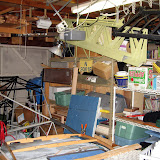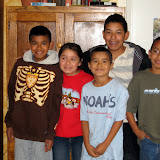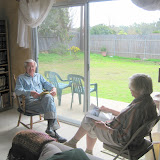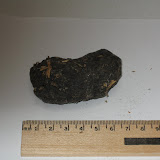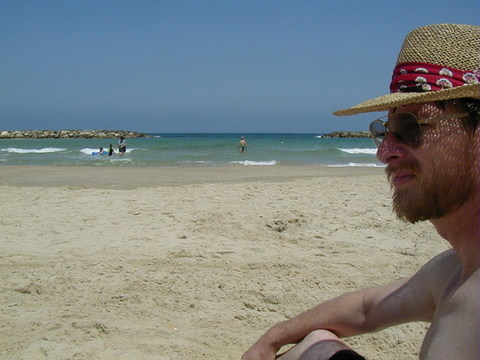Friday, April 04, 2008
Swans and IT
Saturday, March 01, 2008
New Photographs on Picasaweb
| Mar 1, 2008 |
| Feb 18, 2008 |
| Feb 14, 2008 |
| Feb 13, 2008 |
| Jan 29, 2008 |
Thursday, February 28, 2008
Greg 'Gerg' Gilbert
As a first year student, he immediately showed brilliant ability in all things Computer and Network. He worked hard, understood things apparently instantaneously and with ease, and with laughter that came easily, disarmed the stressful moments inherent in any IT Support situation. Several times I came in to the office in the morning to find Gerg asleep on the floor of one of the IT cubicles, having worked on some project through the night until his eyelids would no longer stay open. His passion led him to become a regular contributer to the open-source community, becoming the maintainer of numerous modules for Linux-based handhelds and the debian Linux distribution. His focus on IT led him to leave Westmont and work at Brooks with Greg Lawler, who was able to put his talents to use full-time in development and support there. Greg Lawler has written a blog entry at http://www.zinkwazi.com/wp/2008/02/28/greg-gerg-gilbert/ honoring Gerg.
Gerg was gentle, humble, affable, and always eager to help. Even after leaving Westmont, he would chip in on solving some of our most vexing problems, and always with a smile, a laugh, a nod that indicated that this was more fun than work for him. All who knew him will grieve his passing.
Peace to the soul of Greg Gilbert.
Sunday, January 13, 2008
On the impact of mobile technology
Aptly classified as ‘disruptive technology’, the small devices that have become ubiquitous over the last decade have great potential. Their advocates see them helping us live fuller, more efficient lives by connecting us with others, coordinating our schedules, entertaining us, and providing us access to a plethora of information. And in many ways cell phones, iPods and the like deliver on the promise. Despite the awkward interfaces typical of their adolescent state of development, they allow us to schedule appointments, text message our friends, watch the last Grey’s Anatomy, listen to our favorite mix of music, catch up on a technology seminar via podcast, get directions to a new restaurant on the road, and expect that our friends will immediately receive and respond to our IM invitation to meet there. All of this connection comes in a handy, lightweight and stylish device easily slipped into a pocket and always connected to a reliable network. In a spirit of unbridled consumer optimism, we look forward to the next iPhone, Wii or talking GPS. Life is good, or so it seems.
But not all is sweetness and light in the land of the instantly-connected.
These technologies are classified ‘disruptive’ for good reason.
Apart from the chaos into which they can plunge the data infrastructure supporting them, they disrupt our established patterns of communication, changing how, what and when we communicate, and more importantly, disrupting the image and reality of who we are.
The need for instantaneity and the limitations of typing on a two-square inch keyboard can override concerns for careful thought, meaningful message and word-craftsmanship. What we communicate via text messages tends to be inane or pointless. And this lack of care often spills over into our other writing. Even more disturbing, we tend to treat the IM or cell phone as more important than the people we’re with. Between classes we text or call our BFFs or helicopter-parents instead of discussing the content of the previous class; we pay scant attention to a lecture while jotting a note on the wall of our Facebook friends; we pride ourselves on ability to dual-task, not noticing that we’re doing both tasks poorly.
Our expectations of others also become skewed: we expect instantaneous response, we judge people if they are slow to respond, we become accustomed to short, choppy and disjointed interaction, and tune out extended discourse.
Our shortened attention span may be related to the effect of the barrage of IM and email messages on our brains: I recently read research that high volumes of email have the same deleterious effect on memory as smoking marijuana, but (tellingly) I can’t remember where. But I’m pretty sure it’s true: maybe my BFFs will IM me a URL. In addition, because instant communication allows almost unlimited spontaneity, we get out of the habit of planning in advance, and simply by virtue of being out of practice, become less adept at doing so.
What should our response be to these disruptive technologies? Reject them in favor of a pastoral, Luddite existence? Uncritically embrace them? Clearly these extremes are inappropriate: our world has changed, and our call to ‘be in the world, but not of the world’ requires critical engagement with technology as well as ideas. We should instead sift the wheat from the chaff: use technology wisely to increase your efficiency and for entertainment, but not at the expense of relationships with the people around you. With apologies to Timothy Leary, “Turn off, Tune out, Drop in”: Turn off your devices, tune out the distractions, and drop in on your neighbors, building life-long friendships.
A tough semester
I am sure there are multitudes out there in cyberspace wondering this very thing.
Well, my mom had a saying: "If you can't say anything good, don't say anything at all."
Of course as a young whippersnapper, I'd retort that what she really meant is
"If you can't say anything well, don't say anything at all," but I digress.
Having had an extremely difficult semester, fraught with huge computer server problems, an external review of the IT department, dozens of large, crucial projects to put together and a fairly well developed depression, there was no time during the last half year when I felt I could say anything good, much less say it well.
But things are better: the review resulted in the college looking more realistically at budget, staffing and performance expectations, some of those large projects are in process and will show fruit soon, I've been playing soccer more or less regularly, and things as a whole are looking up.
The next post will be on a topic unrelated to the Zeitah dig: some thoughts on mobile technology, which I wrote in response to a request by the editors of the college's student newspaper.
But this post, believe it or not, actually has something to do with Zeitah. I have been informed by Ron that future plans for Zeitah will involve alternating years of study season, dig season, study season, dig season... and that during the study seasons my services will not be required.
I have mixed feelings about this. If you have read previous blogs, you know that I derive a great deal of pleasure from all that I have been able to learn and to accomplish as part of the Zeitah excavation team. However, this last season was undeniably utterly exhausting. I wish Ron and whomever will participate in the study season all of the very best, and I look forward to the 2009 season being much more positive than the 2007.
Sunday, July 22, 2007
Thoughts from Heathrow
I'm on my way back home. How did this happen, since the last time I slept overnight at Heathrow I vowed never to repeat the performance? Well, a series of unfortunate events conspired against my resolve.
The triggering event was a large storm that moved over Britain and on across the continent. This storm brought with it torrential rains, including a ½ hour gully washer that flooded all runways at Heathrow. As a result, flight operations at Heathrow were shut down completely for 3 hours. As a result of this 3 hour delay, all the planes that had not departed stayed in their bays. This gave no room for any incoming planes once flight operations resumed. Flights from overseas were allowed to land after the worst of the flooding had subsided, but they were stranded in queues on the tarmac.
Our flight arrived at 9 p.m., only ½ hour late, but it was 10:30 before the plane came to a final stop, and a half hour after that that busses arrived to transport us to the Terminal. At midnight, the serpentine queue that led to British customs had dwindled and I finally passed through. It was better in the queue, where I struck up a conversation with a woman and her son from Los Angeles. Another half hour retrieving luggage from amidst the hundreds of pieces of baggage, and I was ready to stake out a spot for sleeping. What impudent optimism! Yes, I am able to find a bench with a free seat, surrounded by a Dutch couple on one side and a large group of oriental people on the other (Korean? I can't tell the difference in the various oriental languages.) The Dutch couple appear to be able to drift off to sleep, but my other neighbors are happily chattering away, a cold draft chilled me whenever the nearby outside door was opened, and I seemed unable to squirm into a comfortable position between the seat, my daypack, laptop bag and the small suitcase.
About 3 a.m., I admit defeat, and move to the next floor up, taking the opportunity to change out of short sleeve shirt and cargo shorts into long sleeve shirt and pants. I curl up on the floor of an airport pub, and get a few winks in before waking up briefly, starting the above paragraph, and then lapsing back into oblivion. Sleep deprivation from the previous 6 weeks hits with a vengeance, and I fall asleep while in mid-sentence.
6 a.m., and I am startled awake by the announcement made by the manager of the pub in which I'm sleeping that the pub opens in ½ hour and everyone needs to get up and out. The dozen or so people who have taken refuge here join me in bleary-eyed exile, stumbling toward washrooms to freshen up. By 7 a.m. I am queueing up for American Airlines' check-in. I have joined half of the free world in this queue - by 7:30 we have barely moved ¼ of the distance to the counter. But as more employees stream in, the line starts going faster, and by 8:30, I'm through the line and on my way to the security check.
I pick up a copy of the last Harry Potter, and start reading it in line for security, get told that I need to drop out of the line until just two hours prior to my flight, get back in line at 9:30, spend the next 2 hours reading H.P. and glancing up at the departure information monitor every 3 minutes to find out which gate the flight departs from. 15 minutes before scheduled departure, gate 13 shows up on the monitor. With only the briefest reflection on how appropriate the flight number is, I go through yet another security and passport check, and our flight leaves at 12:40, only an hour behind schedule. Almost immediately, I fall asleep, and wake up somewhere over the Atlantic near Iceland, watch a movie , fall asleep, read H.P., fall asleep …
Jeanne picks me up at LAX , and two and a half hours later, I'm surrounded by my family, home at last.
Thursday, July 19, 2007
Officially done for the year!
A gazillion backups have been done to CD, thumb drive, and two separate computers;
All the computer stuff I'm not bringing home has been packed up for storage. My suitcase is filled to the brim so that I worry a bit about the zippers popping open, and I'm just about ready to shut down the computers, which is my final task before going off to the airport.
Ron, Connie and Madeleine Tappy left this morning, Erin and I will hitch a ride with Ronen to Tel Aviv today at noon, Sherry goes back home this afternoon. I'm feeling pretty much sleep-deprived, and I hope I will be able to get sufficient sleep on the flights home.
The blogging this season has been what Barbara would call 'miserable miniscule scraps', and I hope to make it up by doing some reflection about the experience later.
Tuesday, July 17, 2007
The final numbers are in:
| Item | Quantity |
|---|---|
| Loci | 227 |
| Buckets | 573 |
| Guphas | 7299 |
| MC Readings | 894 |
| Pottery Readings | 5447 |
| Pottery Sherds | 72178 |
Comparing with last year's numbers,
- MC Readings are up 89%,
- Pottery Readings are up 153%, and
- Total Pottery Sherds are up 269%
Zeitah data milestone
- First day of 'real excavation' (as opposed to cleaning off weeds from the off-season)
- First Pottery Reading Sheets entered into the database
- First Material Culture log entries entered into the database
- First report created of the bucket readings
- The "end of third week" doldrums
- Delivering the Lecture on Archaeological Computing
- Last day of excavation
- Last day the volunteers are with us
- All Material Culture logs entered
- All Locus Sheets scanned and entered
- All Registered Pottery Drawings scanned and associated
- All Registered Pottery Sheets scanned and entered
- Final Bucket reports distributed
- Final MC reports distributed
- All Pottery Reading Sheets entered
- Pottery percentage reports created
- Final report on computing submitted
- Final Backups
- Packing up
I will need to do some data analysis and generating the factual portion of my report (spreadsheets, databases, etc) and then think about recommendations for next year for my verbal report.
Back to work - hoping to pass milestone 15 shortly!
John
